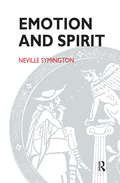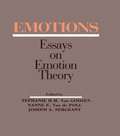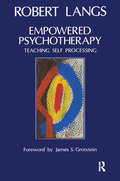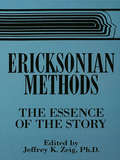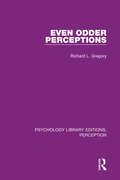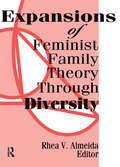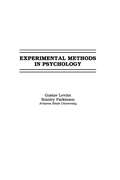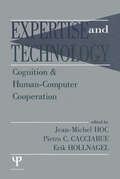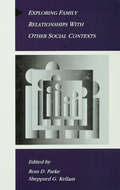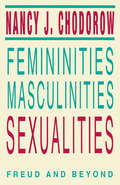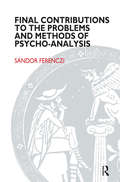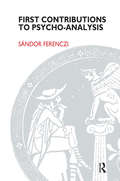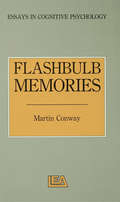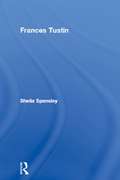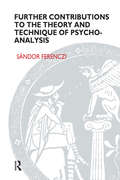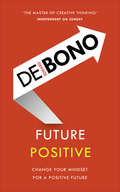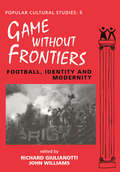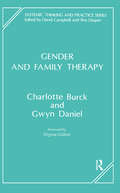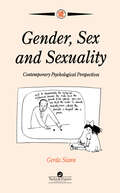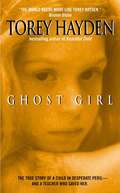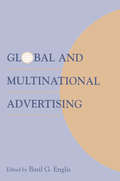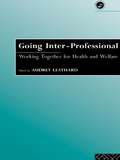- Table View
- List View
Emotion and Spirit: Questioning The Claims Of Psychoanalysis And Religion
by Neville SymingtonPsychoanalysis, with Freud as its founder, has vehemently denied the value of religious belief. In this radical book, re-issued with a new preface by the author and a foreword by Jon Stokes, Neville Symington makes the case that both traditional religion and psychoanalysis are failing because they exist apart and do not incorporate each other's values. The controversial conclusion of this fascinating study is that psychoanalysis is a spirituality-in-the-world, or a mature religion, and inseparable from acts of virtue.
Emotional Contagion
by John T. Cacioppo Elaine Hatfield Richard L. RapsonWhen people are in a certain mood, whether elated or depressed, that mood is often communicated to others. When we are talking to someone who is depressed it may make us feel depressed, whereas if we talk to someone who is feeling self-confident and buoyant we are likely to feel good about ourselves. This phenomenon, known as emotional contagion, is identified here, and compelling evidence for its effects is offered from a variety of disciplines--social and developmental psychology, history, cross-cultural psychology, experimental psychology, and psychopathology. The authors propose a simple mechanism to account for the process of contagion. They argue that people, in their everyday encounters, tend automatically and continuously to synchronize with the facial expressions, voices, postures, movements, and instrumental emotional behaviors of others. Emotional experiences are affected, moment-to-moment, by the feedback from such mimicry. In a series of orderly chapters, the authors provide observational and laboratory evidence to support their propositions. They then offer practical suggestions for clinical psychologists, physicians, husbands and wives, parents, and professionals who wish to become better at shaping the emotional tone of social encounters.
Emotions: Essays on Emotion Theory
by Joseph A. Sergeant Stephanie H. M. van Goozen Nanne E. van de PollBased upon lectures presented at an invitational colloquium in honor of Nico Frijda, this collection of essays represents a brief and up-to-date overview of the field of emotions, their significance and how they function. For most, emotions are simply what we feel, giving our lives affective value. Scientists approach emotions differently -- some considering the "feeling" aspect to be of little relevance to their research questions. Some investigators consider emotions from a phenomenological perspective, while others believe that the psychophysiological bases of the emotions are of prime importance, and still others observe and study animals in order to generate hypotheses about human emotions. Containing essays which represent each of these approaches, this book is in one sense a heterogenous collection. Nevertheless, the variety of approaches and interests come together, since these scholars are all operating from a more or less cognitive psychological orientation and use the same conceptual reference scheme. Written by experts in their own area, the essays reflect the richness of research in emotions. Whether these approaches and opinions can be harmonized into a single theory of emotions is a question which the future will have to answer.
Empowered Psychotherapy: Teaching Self-Processing
by Robert LangsThis book presents some uncommon lines of clinical observation and thought that hopefully will shed new light on the work and thinking of the full range of helping professionals. It provides the insights and techniques that characterize the empowered form of psychotherapy.
Ericksonian Methods: The Essence Of The Story
by Jeffrey K. ZeigFirst published in 1994. Routledge is an imprint of Taylor & Francis, an informa company.
Essays on Economics and Economists
by R. H. CoaseHow do economists decide what questions to address and how to choose their theories? How do they tackle the problems of the economic system and give advice on public policy? With these broad questions, Nobel laureate R. H. Coase, widely recognized for his seminal work on transaction costs, reflects on some of the most fundamental concerns of economists over the past two centuries. In fifteen essays, Coase evaluates the contributions of a number of outstanding figures, including Adam Smith, Alfred Marshall, Arnold Plant, Duncan Black, and George Stigler, as well as economists at the London School of Economics in the 1930s. Ronald H. Coase was awarded the Nobel Prize in Economic Science in 1991.
Even Odder Perceptions (Psychology Library Editions: Perception #12)
by Richard L. GregoryWhy did Newton struggle for thirty years to make gold by alchemy – and then become Master of the Mint? Why do we blush? Why do we have illusions? In this collection of essays, originally published in 1994, Richard Gregory once again delights and tantalizes with tales of his childhood, his family and friends, the famous and the infamous, and weaves them into a rich pattern to illuminate scientific principles and puzzles. If you can put the book down, each essay is complete on its own, but they are united by the magic of human perception. From seeing and hearing to feeling and believing, from the shape of traffic signs to knowledge of quantum mechanics, all our interactions with the outside world are mediated by perception. Our knowledge is further distilled by the machines which help our own biological mechanisms, like microscopes and telescopes, electric light, and even more powerfully by computer technology. But if the natural structures of perception can affect our interpretation of the world, how much more dramatically might science education and tools of information technology enhance – though sometimes mislead – our perception of reality? Even Odder Perceptions may not have all the answers, but it certainly poses more questions.
Expansions of Feminist Family Theory Through Diversity
by Rhea AlmeidaExpansions of Feminist Family Theory Through Diversity reconstructs feminist family therapy to include issues of race, class, gender, culture, and sexual orientation. The contributors assist you with creating possible solutions to mental health problems in all types of families. This will enable you to find specific working strategies to help solve the problems inherent in families of diversity. This book also provides you with several conceptual models for approaching the sociopolitical context of family therapy.This collection challenges family therapy as an existing context of power privilege and expands feminist principle and diversity into subject areas such as intimate violence among the racially and sexually different, heterosexual privilege in family life, homosexual and racial oppression, social inequalities within the therapeutic story, and, from Monica McGoldrick, reflections on self as viewed by the multiple social systems of oppression.Clinicians and practicing feminist therapists can find insight into many general topic areas relevant to daily practice, such as: race as a social construct culture in the context of race, class, gender, and sexual orientation assessment and treatment of violence in heterosexual and homosexual families a social critique of therapeutic inequalities addressing the social inequalities in the delivery of mental health the politics of privilege and privacy in family lifeExpansions of Feminist Family Theory Through Diversity is organized in a way that makes it central to all clinical practice. It can be used as a guidebook for family therapists, social workers, counselors (guidance, clergy, and counseling programs) and psychologists who deal with diverse families and their problems.
Experimental Methods in Psychology
by Gustav Levine Stanley ParkinsonThis text focuses on the experimental methods and the associated terminology encountered in the research literature of psychology. Initially, the content is kept simple, so as not to distract from the information on research technique and philosophy. Interesting psychological questions from well researched areas are then examined in detail, permitting a fuller discussion of the problems encountered in specific paradigms. It is in this fashion that the book offers both methods and content. Unique features of this text include: * a detailed discussion of the process of theorizing, coupled with a close examination of psychological constructs, offers the reader an opportunity to see how psychologists think about, develop, and modify their theories, and the part played by research in changing explanations of behavior. * Although it is common for psychologists to be self-conscious in their reasoning, it is uncommon to see an analysis of the logic that they use to draw conclusions. Presenting material that is rarely verbalized but readily acknowledged by experienced researchers, the text contains an overt analysis of the logic of drawing conclusions from research. * Instructors are given a choice among 15 chapters to focus on or combine to suit the course's concentration. For example, instructors have the option of focusing on experimental psychology or a broad-based course including material on research methods in experimental, social, clinical, and applied psychology. * Courses in experimental psychology or research methods are required for every psychology major. Statistical understanding is vital for this curriculum, and this text contains a comprehensive chapter on statistics making it ideal for courses that combine statistics and experimental methods. Other important coverage includes: * an all-inclusive summary of the material found in an introductory statistics class. Although courses in research methods and experimental psychology usually have a statistics prerequisite, the students rarely remember the material when entering the research course. This text provides the instructor with the option of simply assigning the statistics information as a review, rather than repeating the lectures. If the course requirements are such as to necessitate a joint statistics and research methods course -- with the instructor lecturing on both topics -- this text could serve as the single text for the course. A helpful discussion -- accompanied by a valuable table -- demonstrates how to choose an appropriate statistic. All necessary formulas and other familiar statistical procedures -- illustrating computational steps -- are also featured. * a detailed discussion of how to develop tests for use in research. Aside from the value of this information for any researcher, it can be particularly helpful to students who are required to develop original experiments. * an elaborate discussion of methodological issues in outcome research, using smoking cessation and weight reduction programs as examples. Test bank disks for Experimental Methods in Psychology, -- free to adopters -- consist of an average of six short-answer, 11 fill-in-the-blank, and 11 multiple-choice questions for each chapter. The files are in both ASCII and Word-for-Windows formats.
Expertise and Technology: Cognition & Human-computer Cooperation (Expertise: Research and Applications Series)
by Erik Hollnagel Jean-Michel Hoc Pietro C. CacciabueTechnological development has changed the nature of industrial production so that it is no longer a question of humans working with a machine, but rather that a joint human machine system is performing the task. This development, which started in the 1940s, has become even more pronounced with the proliferation of computers and the invasion of digital technology in all wakes of working life. It may appear that the importance of human work has been reduced compared to what can be achieved by intelligent software systems, but in reality, the opposite is true: the more complex a system, the more vital the human operator's task. The conditions have changed, however, whereas people used to be in control of their own tasks, today they have become supervisors of tasks which are shared between humans and machines. A considerable effort has been devoted to the domain of administrative and clerical work and has led to the establishment of an internationally based human-computer interaction (HCI) community at research and application levels. The HCI community, however, has paid more attention to static environments where the human operator is in complete control of the situation, rather than to dynamic environments where changes may occur independent of human intervention and actions. This book's basic philosophy is the conviction that human operators remain the unchallenged experts even in the worst cases where their working conditions have been impoverished by senseless automation. They maintain this advantage due to their ability to learn and build up a high level of expertise -- a foundation of operational knowledge -- during their work. This expertise must be taken into account in the development of efficient human-machine systems, in the specification of training requirements, and in the identification of needs for specific computer support to human actions. Supporting this philosophy, this volume *deals with the main features of cognition in dynamic environments, combining issues coming from empirical approaches of human cognition and cognitive simulation, *addresses the question of the development of competence and expertise, and *proposes ways to take up the main challenge in this domain -- the design of an actual cooperation between human experts and computers of the next century.
Exploring Family Relationships With Other Social Contexts (Advances in Family Research Series)
by Ross D. Parke Sheppard G. KellamIn the 1990s it is no longer "news" that families do not operate independently from other social organizations and institutions. Instead, it is generally recognized that families are embedded in a complex set of relationships with other institutions and contexts outside the family. In spite of this recognition, a great deal remains to be discovered about the ways in which families are influenced by these outside agencies or how families influence the functioning of children and adults in these extra-familial settings--school, work, day-care, or peer group contexts. Moreover, little is known about the nature of the processes that account for this mutual influence between families and other societal institutions and settings. The goal of this volume is to present examples from a series of ongoing research programs that are beginning to provide some tentative answers to these questions. The result of a summer workshop characterized by lively exchanges not only between speakers and the audience, but among participants in small group discussions as well, this volume attempts to communicate some of the dynamism and excitement that was evident at the conference. In the final analysis, this book should stimulate further theoretical and empirical advances in understanding how families relate to other contexts.
Femininities, Masculinities, Sexualities: Freud and Beyond (Blazer Lectures)
by Nancy J. ChodorowThe author of The Reproduction of Mothering examines the problems with how psychoanalysis views sexuality and gender.Nancy J. Chodorow takes her fellow psychoanalysts to task for their monolithic and pathologizing accounts of deviant gender and sexuality. Drawing from her own clinical experience, the work of Freud, and a close reading of psychoanalytic texts, Chodorow argues that psychoanalysis has yet to disentangle male dominance from heterosexuality. Further, she demonstrates the paucity of psychoanalytic understanding of heterosexuality and the problematic polarizing of normal and abnormal sexualities. By returning to Freud and interpreting psychoanalysis through clinical eyes, Chodorow contends that psychoanalysis must consider individual specificity and personal, cultural, and social factors. Such a methodology entails a plurality of femininities and masculinities and enables us to understand a variety of sexualities.Praise for Femininities, Masculinities, Sexualities“Raises challenging questions but makes no easy answers.” —Psychoanalytic Quarterly“[Chodorow’s] convincing analysis leads us to wonder whether it is any longer useful to think in terms of a normative boy and girl, man and woman, father and mother, and heterosexual and homosexual.” —Sally Moskowitz“Chodorow helps us through the dense riches of Freud’s writing, signposting his scattered but significant moments of empathy with women’s subjective experience even as she takes apart his objectified, masculine images.” —The Women’s Review of Books“A provocative reminder that these are complex issues and that humans, with their capacity for individual variation, are complicated subjects.” —Kirkus Reviews
Final Contributions to the Problems and Methods of Psycho-analysis (Brunner-mazel Classics In Psychoanalysis And Psychotherapy Ser. #No. 8)
by Sandor FerencziThis final volume includes "Confusion of Tongues Between Children and Adults" in which Ferenczi formulates his controversal ideas on childhood sexuality, and the conflict between the languages of tenderness and passion. First published in 1955, this book contains papers written by Ferenczi during his last years and some of his unpublished notes. It demonstrates Ferenczi's combination of great clinical understanding and an almost uncanny insight into unconscious process. Among the forty important items included are papers on the following: "Freud's Influence on Medicine", "Laughter", "Epileptic Fits", "Dirigible Dreams", "Philosophy and Psycho-Analysis", "Paranoia", "The Interpretation of Tunes Which Come into One's Head" and "The Genesis of Jus Primae Noctis".
Finding Joy: 101 Ways to Free Your Spirit and Dance with Life
by Charlotte Davis KaslFrom the book jacket: In Finding Joy, Charlotte Davis Kasl offers her readers an insightful, spiritual, yet light-hearted guide for bringing perspective and balance to life. She takes us on a path to joy that includes playfulness, creativity, honesty, and self-acceptance. Instead of being immersed in life's dramas, she helps us dance lightly with them, bringing a sense of fascination to our lives as they unfold. Through a wealth of creative and playful strategies she helps us release fear, self-criticism, buried feelings, and shame, and accept ups and downs as a natural part of life. From this perspective we are able to relax and be open to solutions and alternatives that seldom come when we are tense, serious, or immersed in blame. She also shows how the positive power of joy can help us bridge differences between groups of people, help us find our common bonds and lead to a more peaceful world. This positive, realistic book helps the reader tap into the wonder and wisdom within us and around us. Whether we are struggling with depression, coping with everyday difficulties, or simply wanting more joy, this is a welcome guide to help us free our spirits and dance with life.
First Contributions to Psycho-analysis (Brunner-mazel Classics In Psycholoanalysis Ser. #No. 6)
by Sandor FerencziThis book is a collection of Ferenczi's early papers which secured him, in an amazingly short time, his prominent position among Freud's followers. Included here are several of the papers that now belong to the classics of psychoanalysis, such as: "Introjection and Transference", "On Obscene Words", "On Onasism: Stages in Development of the Sense of Reality" and "The Ontogenesis of the Interest in Money". In addition it contains Ferenczi's pioneer papers on impotence, homosexuality, paranoia, and symbolism.
Flashbulb Memories (Essays in Cognitive Psychology)
by Martin ConwayThis book provides a state-of-the-art review and critical evaluation of research into 'flashbulb' memories. The opening chapters explore the 'encoding' view of flashbulb memory formation and critically appraise a number of lines of research that have opposed this view. It is concluded that this research does not provide convincing evidence for the rejection of the encoding view. Subsequent chapters review and appraise more recent work which has generally found in favour of the flashbulb concept. But this research too, does not provide unequivocal support for the encoding view of flashbulb memory formation. Evidence from clinical studies of flashbulb memories, particularly in post-traumatic stress disorder and related emotional disturbances, is then considered. The clinical studies provide the most striking evidence of flashbulb memories and strongly suggest that these arise in response to intense affective experiences. Neurobiological models of memory formation are briefly reviewed and one view suggesting that there may be multiple routes to memory formation is explored in detail. From this research it seems possible that there could be a specific route for the formation of detailed and durable memories associated with emotional experiences. In the final chapter a cognitive account of flashbulb memories is outlined. This account is centred on recent plan-based theories of emotion and proposes that flashbulb memories arise in responses to disruptions of personal and cultural plans. This chapter also considers the wider functions of flashbulb memories and their potential role in the formation of generational identity.
Frances Tustin (Makers of Modern Psychotherapy)
by Sheila SpensleyFrances Tustin describes the life and clarifies the work of an outstanding clinician whose understanding of autistic and psychotic children has brilliantly illuminated the relationship between autism and psychosis for others in the field. Sheila Spensley defines Tustin's position in traditional and contemporary psychoanalytic theory and explains how it is related to work in infant psychiatry and developmental psychology. She makes Tustin's original concepts accessible to the non-specialist reader and shows how relevant they are to work in other areas such as learning disability and work with adult patients.
Further Contributions to the Theory and Technique of Psycho-analysis (Brunner-mazel Classics In Psychoanalysis Ser. #No. 7)
by Sandor FerencziCharts the development of Ferenczi's 'Active Technique' in papers such as "The Technique of Psychoanalysis" and "Further Development of an Active Therapy". Ferenczi made outstanding contributions to the theory and practice of psychoanalysis. This volume, first published in 1926, brings together the fruit of ten year's work and study. Primary medical in orientation and concerned with technique, it covers a wide range of topics: Nosology, Technique, Sexual Theory, From the Nursery, Dreams, Symbolism, Applied Psycho-Analysis, Medical Jurisprudence and Religion.
Future Positive
by Edward de Bono‘Of one thing in life we can be sure. The quality of our life in the future will depend on the quality of our thinking.’Why are we so prone to be negative? And how can we become more positive, both as individuals and as a society? The answer lies in the way we think. The key to positive thinking is developing new concepts, whether this means coming up with a brand new idea or just looking at an existing one in a new light. If we make a deliberate and positive effort to change our thinking we can secure a positive future, and we can harness the focused power of human thinking by releasing it from its pettiness. Edward the Bono is the Nobel Prize nominated father of creative thinking and the master of training the mind to think the right way. He wrote the multi-million copy bestseller Six Thinking Hats and many other revolutionary works on how to think. This classic work was first published in 1979, and since then our belief in the power of positive thinking has only become stronger.
Games Without Frontiers: Football, Identity and Modernity (Popular Cultural Studies)
by John WilliamsWhat is the historical appeal of football? How diverse are its players, supporters and institutions throughout the world? What are its various traditions and how are these affected by pressures to modernize ? In what ways does the game help to reinforce or overcome social differences and prejudices? How can we understand football’s subcultures, especially football hooligan ones? The 1994 World Cup Finals in the United States have again demonstrated the conflicts which exist around football over its international future. The multi-media age beckons new audiences for top-level matches, but worries remain that the historical and cultural appeal of football itself may be the real loser. The global game has a breadth of skills, playing techniques, supporting styles and ruling bodies. These are all subject to local and national traditions of team play and fan display. Modern commercial influences and international cultural links through players and fan styles, are accommodated within the game to an increasing extent. Yet, football’s ability to differentiate remains: at local, regional, national and even continental levels. In some cases the game’s traditions ensure that these differences are becoming as oppositional today as is modern football hooliganism. But, the overall picture is one of a game without frontiers - rich in historical and cultural detail, pluralistic in its traditions and identities. This volume brings together essays by leading academics and researchers writing on world football. Their studies draw on interdisciplinary researches in England, Scotland, France, Italy, Germany, Austria, Argentina and Australia. The book will be of interest to students of sports science, cultural studies and social science and to all those who simply enjoy football as the world's greatest sporting passion.
Gender and Family Therapy (The Systemic Thinking and Practice Series)
by Gwyn Daniel Charlotte BurckBurck and Daniel share the personal meaning that gender holds for them, and the open and enquiring, rather than definitive, style of their writing makes it easy for the reader to grasp their ideas. The authors' handling in the early chapters of the many intellectual conundrums about gender is clear and assured, and through their many citations of other literature in the field they have managed to align this volume with other scholarly works while at the same time ensuring a very readable and practical book.
Gender, Sex and Sexuality: Contemporary Psychological Perspectives (Contemporary Psychology Ser.)
by Gerda SiannFor some time sex has been defined as the biological difference between men and women, and gender as the manner in which culture defines and constrains these differences. Feminine/masculine, male/female, women/men, boy/girl - terms of sexual and gender division like these permeate the way we think and talk about ourselves and each other. On most occasions we find their use non-problematic and people employ them easily, at other times, however, particularly if we are interested in psychology, we may wonder whether this ease is illusory.; One may speculate whether being a woman necessarily implies being "feminine". One may question why young women are often referred to as girls, while men are seldom referred to as boys. Is dressing in a stereotypically feminine manner a reliable indication that a woman is heterosexual? What about cross dressing? Why do these topics hold so much fascination for the media?; "Gender, Sex and Sexuality" examines the effects that the inequalities experienced between men and women have had on the psychologies of both sexes, and the battle to remove them. It aims to introduce the reader to current research and theories, drawing on novels, theatre, soap operas, as well as research for case histories.
Ghost Girl: The True Story of a Child in Desperate Peril - and a Teacher Who Saved Her
by Torey L. HaydenRecounting her experiences with Jadie, a student in her class, a teacher describes how she persuaded Jadie to break her silence and reveal the family secrets that were plaguing her. The true story of a child who refused to speak and the teacher who finally got through to her--uncovering a dark history of child abuse and possible satanic rituals--from the bestselling author of One Child. "A testament to the powers of caring and commitment."--Publishers Weekly.
Global and Multinational Advertising
by Basil G. EnglisFew applied disciplines are more sensitive to cross-cultural issues than marketing and consumer psychology. The chapters prepared for this volume reflect awareness of both similarities and differences within and across cultures. They include analyses of methodological issues, theoretical investigations of cultural and social values and their implications for marketing specialists, studies of gender- and sub-culture specific advertising, and investigations of advertising efforts in several different international markets. The scholars and advertising professionals who contributed these chapters will have much to say to consumer psychologists and marketing specialists alike.
Going Interprofessional: Working Together for Health and Welfare
by Audrey LeathardHealth and welfare professionals increasingly have to collaborate and co-ordinate their practice in order to provide a more integrated service for the consumer. Going Inter-Professional brings together academics, professionals and researchers to assess the implications for all the professions involved and the practical developments in hospitals, general practice and community care. Individual contributors look at: * the theoretical background to inter-professional work * education and management issues * inter-professional practice issues in work with children, disabled, elderly and mentally ill people * the implications for carers * developments in Australia, Western Europe and the USA
